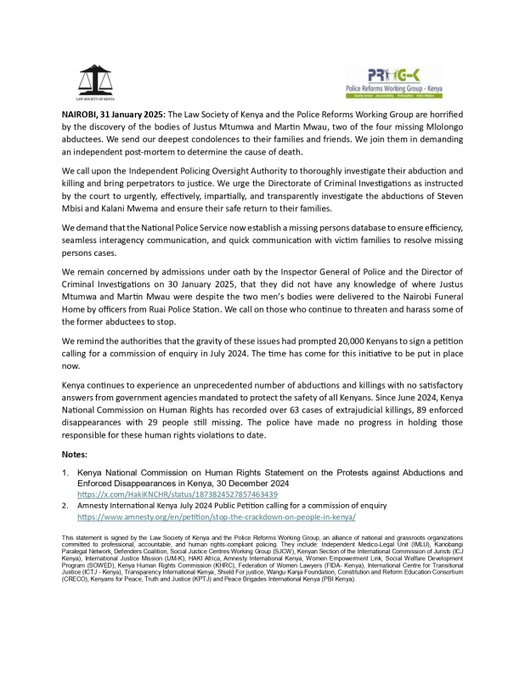NAIROBI, Kenya – The discovery of the bodies of Justus Mtumwa and Martin Mwau, two of the four men abducted in Mlolongo, has sparked renewed outrage.
According to the statement from the Law Society of Kenya (LSK) and the Police Reforms Working Group, the organizations are horrified by the deaths and have expressed their deepest condolences to the families of the victims.
They are calling for an independent post-mortem to determine the exact cause of death and to ensure those responsible are held accountable.
63 killed. 89 disappeared. 29 still missing. Kenya is facing an alarming wave of abductions and extrajudicial killings, yet those responsible remain free. We demand urgent action, accountability, and justice for the victims. Read full statement: amnestykenya.org/statement-on-t…
But the pressing question remains: Why do authorities seem unable—or unwilling—to stop the abductions?
A System Failing Its Citizens
Kenya has been facing a troubling rise in abductions and extrajudicial killings, with little to no transparency from those entrusted with public safety.
Since June 2024, the Kenya National Commission on Human Rights (KNCHR) has recorded over 63 extrajudicial killings and 89 enforced disappearances, with 29 individuals still missing.
Yet investigations into these incidents have largely stalled, leaving many to question whether justice will ever be served.
According to the statement, the Independent Policing Oversight Authority (IPOA) is urged to conduct a thorough investigation into the abductions and killings of Mtumwa and Mwau, as well as the disappearances of Steven Mbisi and Kalani Mwema.
The Directorate of Criminal Investigations (DCI) is also under pressure, as they are expected to act swiftly, impartially, and transparently in these cases.
Despite this, the lack of progress raises serious concerns about whether the investigations will be carried out effectively.
In a shocking revelation during a January 30, 2025 hearing, both the IG of Police and the Director of Criminal Investigations testified under oath that they had no knowledge of the whereabouts of Mtumwa and Mwau—despite the fact that their bodies had been delivered to the Nairobi Funeral Home by officers from Ruai Police Station.
According to the statement, this raises further doubts about the integrity of the investigation process.
A Missing Persons Database—Long Overdue
According to the statement, there is an urgent need for a centralized missing persons database to address the inefficiencies in the handling of abductions and disappearances.
Families are often left in the dark, and agencies fail to communicate effectively with each other.
The statement calls for the National Police Service (NPS) to establish such a database to improve coordination, speed up case resolutions, and provide victims’ families with timely updates.
The implementation of such a system has been proven to work in other countries, making it all the more critical for Kenya to act now.
20,000 Voices, Still Ignored
The call for change is not new. In July 2024, 20,000 Kenyans signed a petition demanding the establishment of a commission of inquiry into enforced disappearances and extrajudicial killings.
According to the statement, this petition is a clear sign of public dissatisfaction with the lack of accountability.
However, the government has yet to respond, and the pattern of disappearances, killings, and inaction continues.




